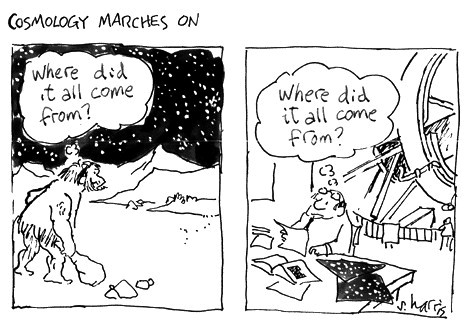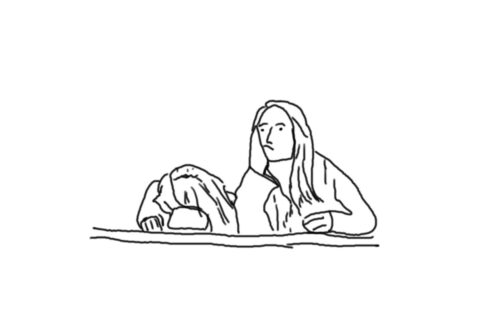Plain Theism is the view that ‘God exists’ is a logically contingent proposition. ‘God exists’ is neither necessarily true nor necessarily false. In contrast, necessitarian theism holds that the proposition, ‘God exists’ is necessarily true. In other words ‘it is false that God exists’ is a contradiction.
I often wondered what would motivate my old prof, Keith Yandell to hold to plain theism. What does it mean to say that God does not have necessary existence or that ‘necessarily, God exists’ is necessarily false? Most theists contend that if ‘God exists’ is true, it is true necessarily.
The answer, I think, lies in some of Dr. Yandell’s theistic argumentation. In his excellent introduction to the philosophy of religion, Dr. Yandell carves out an extended version of the cosmological argument. In this argument, he teases out an assumption that works for the argument but entails plain theism. Due to the length of the argument, let me present a ‘supplemental’ argument for the conclusion that materialism is false. The argument assumes the same premise.
The first stage of the argument is straight forward:
(1) It is logically possible that an omnicompetent being exists
(2) If it is logically possible that an omnicompetent being exists, then it is logically possible that an omnicompetent being destroy everything material
(3) Therefore, it is logically possible that an omnicompetent being destroy everything material
If we accept the argument, then we have the plausible conclusion that material things can all be destroyed. If you or I were a supremely powerful disembodied soul, then we could have a huge bonfire and burn the universe. We could ensure that not one particle of matter was left standing. This sounds weird but entails no contradiction. Thus, it is logically possible (a proposition is logically possible if and only if it is not necessarily false).
What Yandell takes this to mean is that material things do not have necessary existential security. If X has necessary existential security, X exists and, necessarily, X is not caused to exist and does not depend on anything else for its existence. Clearly, material things have no such thing. The next step argues this point:
(4) If it is logically possible that an omnicompetent being destroy everything material, then nothing material has necessary existential security
(5) Therefore, nothing material has necessary existential security
The next step is the crucial part of the argument for it assumes the truth of a proposition that entails plain theism:
(6) If nothing material has necessary existential security, then something exists that is not material
(7) Therefore, Something exists that is not material
(6) is the crucial premise and relies on a version of the Principle of Sufficient Reason. According to Yandell, what is required in this case is the following:
“If it is logically possible that the truth of a logically contingent existential proposition be explained, then there is an explanation of its truth”
Yandell’s strategy is to claim that some existential statements require explanations. In contrast, a version of the argument focused on beings would suggest that the existence of X requires the existence of Y. Y has some causal or other power sufficient to bring about the existence or sustenance of X. However, Yandell suggests that we see the dependence in terms of the logical relationships between propositions. The proposition ‘nothing material has necessary existential security’ is a logically contingent proposition. It is also a proposition that it is possible to explain by reference to another proposition.
However, this strategy entails that the proposition one refers to not be a logically necessary truth. If a proposition, P, is a logically necessary truth and it entails Q, then Q cannot be logically contingent. This, in turn, entails that the explaining proposition must itself be logically contingent but must also lack the possibility of an explanation.
Therefore, the proposition ‘something exists that is not material’ is a logically contingent proposition that is not logically possible to explain. This entails that ‘necessarily, something exists that is not material’ is necessarily false. For if a proposition is logically contingent, then it is necessarily logically contingent.
Yandell presumably means to suggest that the non-material entity in question does have necessary existential security. Though the entity in questions does not have necessary existence, necessary existential security is sufficient to explain the existence of anything that does not have necessary existential security. Voila, plain theism!
The argument concludes with the claim that materialism is false, a conclusion I recommend to you even if Dr. Yandell’s argument does not convince you:
(8) If something exists that is not material, then materialism is false
(9) Therefore, Materialism is false
One might still wonder if getting such a conclusion is worth the price. Wouldn’t necessitarian theism be plain better theism? Furthermore, one might wonder if plain theism itself is workable. In Beyond the Control of God?, a book on the ontological status of abstract objects and their relationship to God, my present prof, Dr. Welty points out that plain theism combined with a commitment to the necessary existence of propositions produces some strange results. Consider the status of the proposition, ‘God exists’. Does the proposition ‘God exists’ have necessary existence? If it exists, then either it necessarily exists or not. If it does and God does not exist, then what are we to make of any proposition with necessary existence? Wouldn’t it be the case that any proposition that necessarily exists would not have a truth value related to reality? On the other hand, if ‘God exists’ does not have necessary existence, then it cannot be true that God exists. Dr. Welty considers this view to entail that God does depend for his existence on something outside himself, a clear denial of the aseity of God.
What seems to motivate Yandell toward his version of the cosmological argument is the problems inherent in traditional claims about existence and change. A common objections to cosmological argument revolve around versions of the principle of sufficient reason. The dilemma presented to the cosmological argument proponent is as follows (Murray and Rea, Introduction to the Philosophy of Religion, 142):
(1) The Actual World is a collection of facts for which an explanation is required. Call this collection, F, and its explanation, E.
(2) If E is a necessary truth and E is a sufficient reason for F, then in every world in which E is true, so F obtains.
(3) (2) entails that only the actual world is possible. This is false, so E is not a necessary truth.
(4) If E is not a necessary truth, then it is only true in a world in which F obtains (the actual world).
(5) (4) entails that there are propositions that are only true in one possible world. The only proposition that is only true of one possible world is equivalent to the proposition, ‘the world described by F exists’ but this proposition is the very proposition we are attempting to explain.
The conclusion of all this is that the principle of sufficient reason leads to unacceptable consequences and should, therefore, be abandoned.
In order to avoid the objection, philosophers commonly reject the principle in favor of other principles such as ‘there can be no independent contingent thing’ (Murray and Rea, Introduction to the Philosophy of Religion, 143) or intentional explanations in terms of beliefs, hopes and desires of an agent (Timothy O’Connor, Theism and the Ultimate Explanation).
The latter approach is exemplified in some versions of the kalam cosmological argument. Here is one from Dr. Welty:
(1) The universe has a beginning
(2) The beginning of the universe is caused
(3) The cause of the universe is personal
In support of (1), suppose the universe has no beginning. If the universe has no beginning and is in time, then it is part of an actual infinite series. But it is highly plausible that there cannot be an actual infinite series. Consider attempting to finish counting (there is always one more).
In support of (2), the universe cannot come from nothing. This is because, whatever begins to exist has a cause of its existence. This is not a necessary truth but it is the most confirmed claim we have! It is, therefore, highly plausible.
Whatever causes the universe cannot itself be in time. This is because if the universe cannot be infinite in time, then neither can its cause.
(3) states that whatever causes the universe must be a person. A person is something with a mental life that includes intentions, and desires. The plain existence of the cause is not sufficient for the effect since if it was not in time and sufficient for the effect, then the universe would always exist. This harks to the first horn of the dilemma facing the principle of sufficient reason. What is sufficient is the additional claim that the cause of the universe must be personal, a being who makes decisions based on intentions and desires. In this case a being can decide to cause the universe or not.
This would entail that the proposition, ‘the cause of the universe is personal’ is true but not that ‘God exists’ is a necessary truth. Importantly, it does not entail its denial either.



